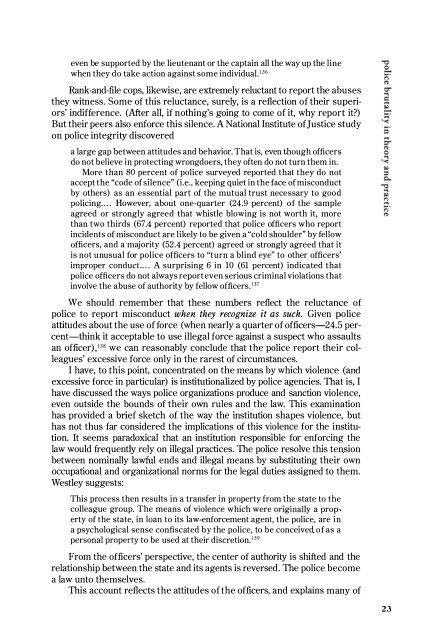Kristian Williams - Our Enemies in Blue - Police and Power in America
Kristian Williams - Our Enemies in Blue - Police and Power in America
Kristian Williams - Our Enemies in Blue - Police and Power in America
You also want an ePaper? Increase the reach of your titles
YUMPU automatically turns print PDFs into web optimized ePapers that Google loves.
even be supported by the lieutenant or the capta<strong>in</strong> all the way up the l<strong>in</strong>ewhen they do take action aga<strong>in</strong>st some <strong>in</strong>dividual.l36Rank-<strong>and</strong>-file cops, likewise, are extremely reluctant to report the abusesthey witness. Some of this reluctance, surely, is a reflection of their superiors'<strong>in</strong>difference. (After all, if noth<strong>in</strong>g's go<strong>in</strong>g to come of it, why report it?)But their peers also enforce this silence. AN ational Institute of Justice studyon police <strong>in</strong>tegrity discovereda large gap between attitudes <strong>and</strong> behavior. That is, even though officersdo not believe <strong>in</strong> protect<strong>in</strong>g wrongdoers, they often do not turn them <strong>in</strong>.More than 80 percent of police surveyed reported that they do notaccept the "code of silence" (i.e., keep<strong>in</strong>g quiet <strong>in</strong> the face of misconductby others) as an essential part of the mutual trust necessary to goodpolic<strong>in</strong>g .... However, about one-quarter (24.9 percent) of the sampleagreed or strongly agreed that whistle blow<strong>in</strong>g is not worth it, morethan two thirds (67.4 percent) reported that police officers who report<strong>in</strong>cidents of misconduct are likely to be given a "cold shoulder" by fellowofficers, <strong>and</strong> a majority (52.4 percent) agreed or strongly agreed that itis not unusual for police officers to "turn a bl<strong>in</strong>d eye" to other officers'improper conduct.. . . A surpris<strong>in</strong>g 6 <strong>in</strong> 10 (61 percent) <strong>in</strong>dicated thatpolice officers do not always report even serious crim<strong>in</strong>al violations that<strong>in</strong>volve the abuse of authority by fellow officers.13?We should remember that these numbers reflect the reluctance ofpolice to report misconduct when they recognize it as such. Given policeattitudes about the use of force (when nearly a quarter of officers-24.5 percent-th<strong>in</strong>kit acceptable to use illegal force aga<strong>in</strong>st a suspect who assaultsan officer) , llS we can reasonably conclude that the police report their colleagues'excessive force only <strong>in</strong> the rarest of circumstances.I have, to this po<strong>in</strong>t, concentrated on the means by which violence (<strong>and</strong>excessive force <strong>in</strong> particular) is <strong>in</strong>stitutionalized by police agencies. That is, Ihave discussed the ways police organizations produce <strong>and</strong> sanction violence,even outside the bounds of their own rules <strong>and</strong> the law. This exam<strong>in</strong>ationhas provided a brief sketch of the way the <strong>in</strong>stitution shapes violence, buthas not thus far considered the implications of this violence for the <strong>in</strong>stitution.It seems paradoxical that an <strong>in</strong>stitution responsible for enforc<strong>in</strong>g thelaw would frequently rely on illegal practices. The police resolve this tensionbetween nom<strong>in</strong>ally lawful ends <strong>and</strong> illegal means by substitut<strong>in</strong>g their ownoccupational <strong>and</strong> organizational norms for the legal duties assigned to them.Westley suggests:This process then results <strong>in</strong> a transfer <strong>in</strong> property from the state to thecolleague group. The means of violence which were orig<strong>in</strong>ally a propertyof the state, <strong>in</strong> loan to its law-enforcement agent, the police, are <strong>in</strong>a psychological sense confiscated by the police, to be conceived of as apersonal property to be used at their discretion. 1.39From the officers' perspective, the center of authority is shifted <strong>and</strong> therelationship between the state <strong>and</strong> its agents is reversed. The police becomea law unto themselves.This account reflects the attitudes of the officers, <strong>and</strong> expla<strong>in</strong>s many of23


